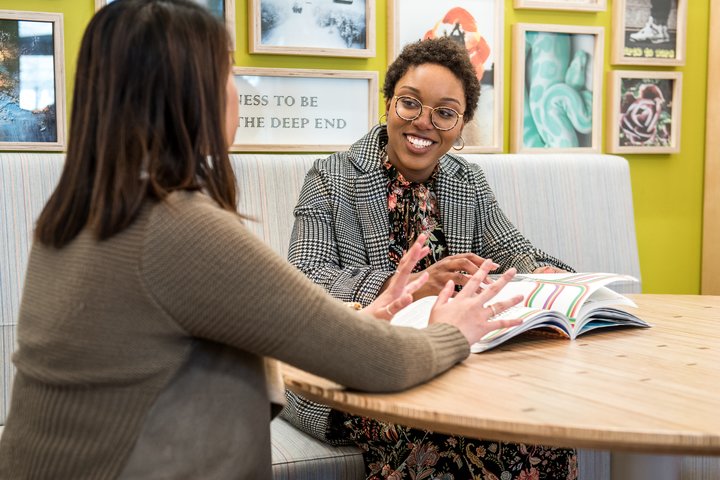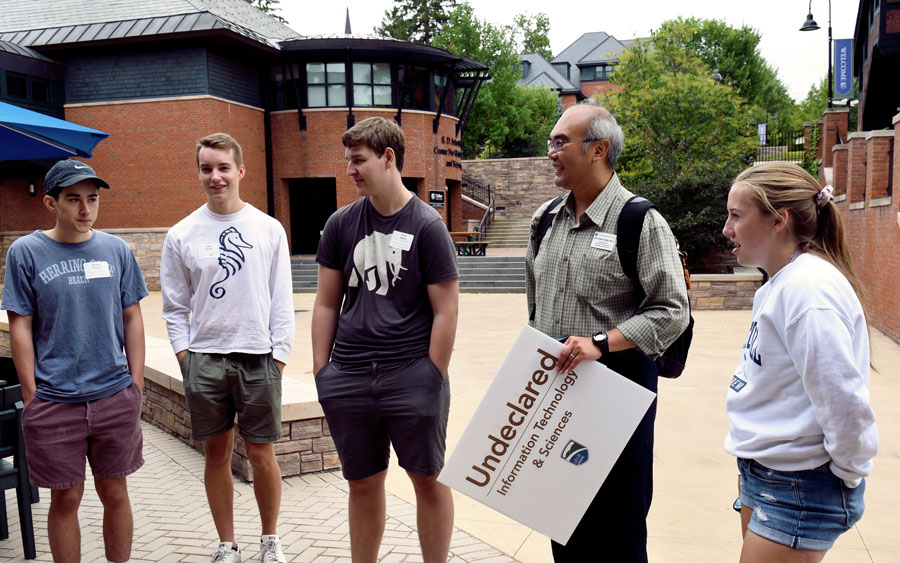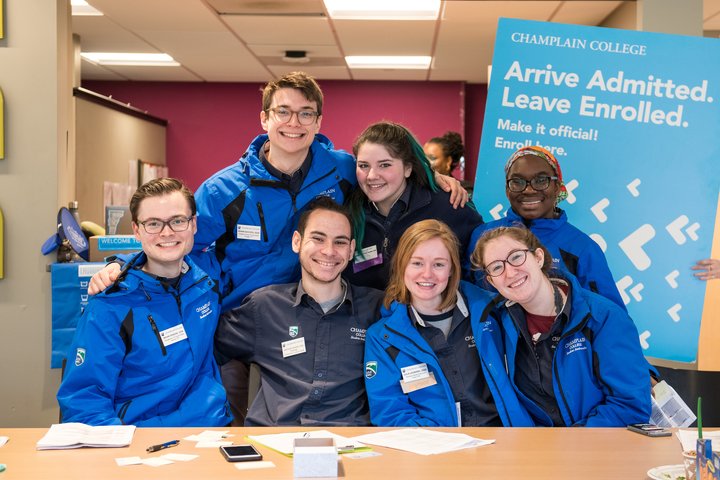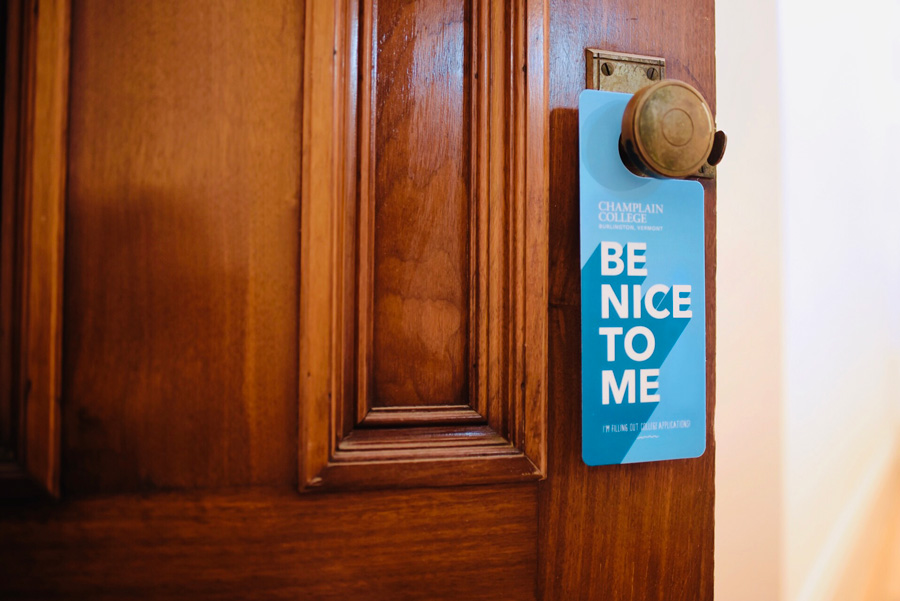Veteran Admissions Director, Diane Soboski, gives the inside scoop on the college application process—and debunks some myths along the way.
We asked Champlain’s Director of Admissions, Diane Soboski, for some insider tips and advice about applying to college—any college—not just Champlain. Soboski’s most important takeaway? College admissions officers want to get to know the real you.
What is the ‘truth’ about how college acceptance and rejections decisions are made?
The truth is that most colleges and universities accept more students than they reject. When college admissions officers are looking through applications, we’re not looking to pick apart every little detail and find fault; we’re looking for reasons to admit a student. Counselors are collecting evidence that supports the idea that a student will be successful and thrive on our campuses both academically and socially—that’s our number one priority.
Students (and parents) are often told that the most important thing they can do is to distinguish themselves in an applicant pool. Frequently this advice is misconstrued to mean that students need to have an incredibly unique story that must be presented to the Director of Admissions in order to make a good impression. In reality, we’re not looking for someone to manufacture reasons as to why they’re different than everyone else, we’re looking to learn about who YOU are: What do you enjoy doing? What have you learned about yourself? Who are you hoping to become? We want to see how you’ll contribute to, and become involved in, the fabric of our community.


We’re looking to learn about who YOU are: What do you enjoy doing? What have you learned about yourself? Who are you hoping to become?
Diane Soboski, Director of Admissions
The best way to do that is to get to know the person who will read your file and advocate on your behalf. For many institutions, this role is assigned by geography and will be the person who visits your area or covers your region of the country. Get to know that person. Introduce yourself and let them learn more about who you are, why you’re interested in the college, and what you feel you could offer. It’s much harder to say no to someone when you’ve already pictured them on your campus. If a college offers the opportunity to interview, take it. If they offer the chance to meet 1:1 with a counselor or student ambassador, do so. These meetings will not only provide more context for your application file, but will help you determine if this school is where you want to spend the next four years of your life.
How does Admissions decide between similar candidates?
Admissions officers are often asked about how we compare similar candidates, usually with a phrase like, “if all things are equal…,” and it always makes me laugh. The reality is that nothing is ever equal and candidates are rarely very similar. Our job is to take an applicant’s file, sift through all the information, and learn as much as we can about that student. If we’re doing our job well, students won’t seem all that similar because each file has its own story to tell.
At Champlain College, we practice holistic admissions. This means that we look at each and every factor in the file. Are some factors more important? Sure. How you’ve performed in high school is a great indicator of your ability to succeed on our campus, so that detail is highly important to us. However, students are so much more than their GPA. We also look contextually at all the other materials submitted. A student who writes about overcoming an obstacle that affected their studies gives us a lens through which to view their transcript. When a student writes about their high school activities and involvement, that helps us understand how they enjoy spending their time. It prompts us to think about how they might get involved on our campuses.


We’re not trying to pit students against one another. We don’t have multiple application files open at one time to compare one to another. Each application is reviewed separately based on the merits within that file. We’re looking to create a diverse and engaging campus culture, which means that we welcome all types of students. There’s no one “cookie cutter” mold of what a Champlain student looks like, and no one demographic factor is favored. As a leader in innovation, Champlain College is looking for students who are original thinkers: driven, creative, entrepreneurial. We want to see what you will bring to campus, and if we feel you’d be a good fit, we’re happy to extend an offer of admission.
As a leader in innovation, Champlain College is looking for students who are original thinkers: driven, creative, entrepreneurial.
Diane Soboski, Director of Admissions
What is your philosophy and what are the keys to success in the college admission process?
My philosophy is that if you allow yourself to fully embrace the process, and if you’re open to exploring new and different options, you will find a college that is right for you. There’s no one college that’s the perfect fit for a student. I know that’s a risky statement to say as a Director of Admissions, but it’s true. Our hope is that students will experience that “ah-ha” moment, fall in love with our campus, and never look back. The truth is, there are likely a number of colleges out there that you could be very happy attending.
Be open to exploring new possibilities. Try visiting a college you’ve never heard of that has similar characteristics to one you really like. Don’t get caught up in rankings or wanting to go somewhere because you know someone else who attended. This is an incredibly personal process and every student will react differently when they set foot on a college campus. Take the time to get to know people at the school: talk with current students, eat in the dining hall, shadow a class or speak with faculty if you can.
And be yourself—in the end, that is how you will truly stand out in the application process.


What’s your best advice for students who are applying to college?
Take a deep breath, and know it’s going to work out. This is an overwhelming process, and it can consume your life during senior year if you let it. Balance is key. There are a lot of deadlines to keep track of and it’s important to meet them. My suggestion is always to take the earliest admissions (or financial aid!) deadline and use that as your target goal for completing all applications. Nothing causes a family disagreement faster than when someone at the dinner table says, “Wait—did you not submit that?” Coordinate with your parents to ensure that all deadlines are met and try to avoid doing them at the eleventh hour if you can help it.


You also need to carve out some time for non-application related activities. Make time for yourself, your family, and your friends. Don’t let college applications and decisions be all-consuming. It’s a very important time in your life—one you’ve worked hard to get to. If you’re able to find a balance between working hard to complete applications and letting yourself enjoy some downtime, you’ll feel much more relaxed.
And remember: admissions and financial aid officers are here to help! Don’t be afraid to reach out to us if you have any questions, concerns, or problems. We’re happy to help walk you through this process!